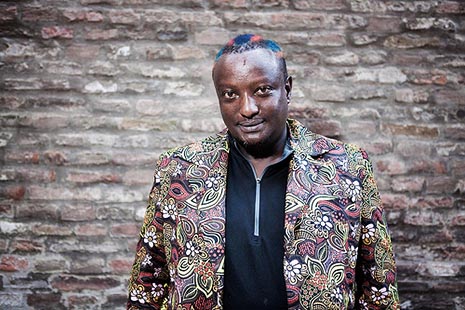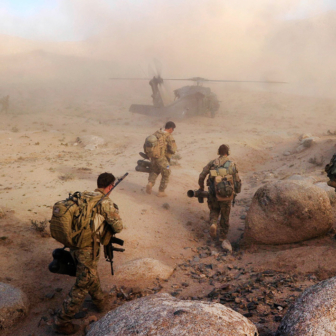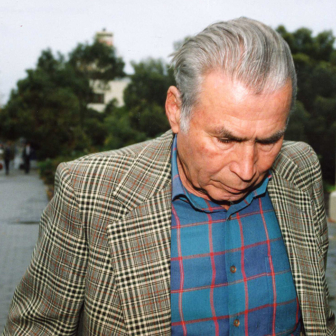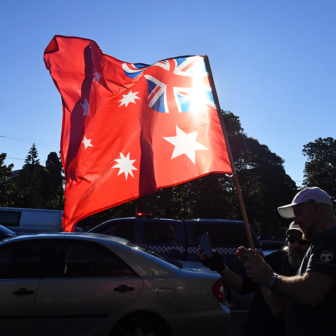BINYAVANGA Wainaina is feeling “schizophrenic.” The Kenyan writer, who recently moved back to his homeland, is struggling to untangle how he feels about his country’s new president.
His dilemma is shared by many people, from ordinary Kenyans to diplomats and world leaders. Essentially, it boils down to this: what do you do when the new, democratically elected leader of one of the West’s African allies has been indicted for crimes against humanity and is due to stand trial soon at the International Criminal Court, or ICC, in the Hague?
The question is complicated by the rise of a new, morally opaque world order. In this post-9/11 reality, perceptions of “the West” – if this is taken to mean the United States, Britain and other European countries – have changed dramatically, and shifting economic tides have also played their part in relocating traditional centres of power.
For Wainaina, who won the Caine Prize for African Writing in 2002 but is perhaps best-known for his satirical essay “How to Write about Africa” and his 2011 memoir, One Day I Will Write about This Place, this global upheaval seems particularly relevant to Kenya, where Uhuru Kenyatta was elected president in March by the slimmest of margins.
Kenyatta, the son of the former British colony’s first president, Jomo Kenyatta, is due to stand trial at the ICC in July for his alleged role in inciting and financing the political and tribal violence that followed the 2007 election. Around 1200 people were killed during that conflict, thousands were driven from their homes, and Kenya’s international image was hammered.
Kenyatta and his running mate, the new deputy president William Ruto, are among four people charged by the ICC. They say they are innocent, and the indictments seem, if anything, to have helped the scion of Kenya’s first family win the presidency.
Like many Kenyans, Wainaina has been disappointed by the ICC, and has trouble reconciling his desire for justice with a feeling of unease over who is dispensing this justice, and why.
“Do I feel it is a blow against impunity?” he says over coffee at an upmarket mall in Nairobi. “No, I don’t. Do I want legal accountability for what happened? Most certainly… and that is now where the schizophrenia comes in.”
Wainaina, whose words sometimes spin off like Catherine wheels, says that there is “no way” he wants to see the Kenyan president sitting inside the Hague “and our country weakened” at a time when “the stakes over Kenya and the continent are really high.” And it seems as though this is a possibility that Western leaders would also rather avoid, not least because of Kenya’s importance as a political and military ally in a volatile region, but also because of its economic heft.
Before the election, Britain’s high commissioner to Kenya, Christian Turner, said that his country would only have “essential contact” with ICC indictees. As the US assistant secretary of state for African affairs at the time, Johnnie Carson, said, “choices have consequences” – a not-so-subtle warning that a vote for Kenyatta could be risky.
This strategy backfired as Kenyans rallied to Kenyatta and Ruto, the leaders of two of the country’s largest tribes whose members fought bitterly after the last election. The alliance tapped into an almost visceral desire for peace, and a refusal to be told what to do by “the West.”
Now that Kenyatta is president, Britain, at least, appears to be reassessing its policy. In May, prime minister David Cameron invited Kenyatta to a conference on Somalia, where Kenyan troops have joined African Union forces battling the Islamist extremists of al-Shabaab. “Kenya is a vital partner on Somalia and we judge our contact according to the issue concerned,” a spokesman for Britain’s Foreign Office said.
It was a bland statement to deal with a spicy political conundrum. As Richard Dowden, director of the Royal African Society, wrote in May, no one ever envisaged a situation where someone indicted for crimes against humanity would be elected president. A “major diplomatic earthquake” was in the offing, he wrote. “I used to think that Britain’s obligation to the ICC would trump its relationship with Kenyan politicians but now I am not so sure. Either way a major train smash is on the way… It’s either the end of the ICC or a deep rift between those committed to the ICC and Africa.”
Wainaina says the ICC has been inept and misguided. He feels that it should have indicted former president Mwai Kibaki and opposition leader Raila Odinga for the 2007 violence because they were the main contenders in that poll. “It was very important also that the trials were fully under way before the 2013 election,” he says. “The Rift Valley was not prepared to risk more violence without a political solution or a muscular and relevant legal process. Time ran out for the ICC.”
LIKE many Kenyans, Wainaina says he bought into the idea of international justice when it was first mooted. But he believes that Luis Moreno Ocampo, the ICC’s chief prosecutor at the time, failed to use the opportunity to put together a meaningful case. “He made many terrible choices, and left the Kenyan cases in a shambles as we watched and time ran out,” he says.
“It is as if they do not have the structures needed to properly investigate and dispense timely and durable justice,” Wainaina continues, referring to the ICC. “Their sinking ship of promises promised more chaos, not less. Justice has to be more than this. It seems as if the Kenya case is only a showpiece to earn credibility for a new and still-unreliable court. Why gamble my country’s fate on their fits and starts? If they can show they can dispense justice now, fine. We can no longer make our plans based on that.”
As the ICC cases against both Kenyatta and Ruto stumble forward – prosecutor Fatou Bensouda says there has been unprecedented intimidation of witnesses – Wainaina, like many Kenyans, is becoming ever more sceptical, especially in the wake of the extraordinary political energy that coalesced around the Kenyatta–Ruto campaign.
“Is it that the ICC was battling all along,” he wonders, “or is it that the force of that energy… its sheer kind of steamrollerness are making the ICC seem weak? Because it seems weak to me. It doesn’t have the same moral validity as it had two years ago.”
Wainaina also takes issue with the ICC’s argument that it has been hindered by a lack of cooperation from the political elite. He says the ICC should not portray itself as a victim of “Kenyan mafias.” “I’m a Kenyan, I’m a victim of the shenanigans of the Kenyan mafia. Witnesses disappear. That is the environment we live in and now you people are saying you can’t hack it, so how is it that you can do this job?”
There is also something deeper at work – alongside a decades-old unwillingness to be dictated to by Britain and other foreign powers, there is a sense that these global heavyweights have lost their moral legitimacy in a world where their economic might is declining, where China is pushing outwards, and where the “war on terror” and the use of drones and other military tactics have blurred the lines between what states can and cannot do.
“When you say consequences,” Wainaina says, returning to Carson’s statement, “are you saying, ‘because we are standard bearers of democracy’? We’ve been in this world since 2001, and seen what’s happened. The feeling that there was a possibility of good coming in this global exchange from that free world, called the West, is really significantly challenged. I’m not feeling like there is a fair deal, and I’m feeling like that deal can drop a bomb on you at any time. I don’t want to be playing games with any of your institutions because I don’t trust them, or what they stand for. I don’t trust their legitimacy.”
He points to the example of Britain opening up to Narendra Modi, the chief minister of the Indian state of Gujarat, who has been described as a “modern day Nero” for not doing enough to halt vicious religious riots in his state in 2002. “I was very, very surprised, and not satisfied,” Wainaina says.
Beyond the specifics of the Modi case, the British move to woo the Indian state leader, Wainaina says, is indicative of a trend that he does not find displeasing. “With the whole multi-polar game going on, I’m grateful there is no longer any easy way to ride roughshod,” he says. “I’ve never been in a situation… where you felt… our diplomatic relationship with Europe mattered at all… Our diplomatic relationships have been changing and they are going to change a lot more. That’s been my opinion for years, but I’ve just now felt it in a more solidified way.”
Wainaina says we are witnessing a sort of “nervous breakdown” on the part of the United States and Europe, prompted by the spread of Islamist extremism, and the West’s reaction, which is often perceived as an aggressive, interventionist approach by which anyone can be killed at any time in the name of the “war on terror.”
But if the West has lost its moral compass, who can answer the calls for justice from the victims of the 2007–08 violence? Wainaina says the responsibility must revert to the Kenyan state and, although there is a new energy after the March election, and from the passage of a new constitution in 2010, there are also disturbing trends, not least a heavy-handed approach to security.
Kenya is still deeply divided, perhaps more so than ever. With power centralised in the hands of a Kikuyu (Kenyatta) and a Kalenjin (Ruto), the Luos, who mostly supported losing candidate Odinga, feel left out – and perhaps cheated, given the controversy over Kenyatta’s slim victory.
“The beginning signs are not great,” says Wainaina. “I feel like we were asked to suspend a sort of disbelief in that election and we have been chafing. That kind of consensus became darker and darker as we waited for the results. I was waiting for the fever to break.” He cites recent violence in the western districts of Busia and Bungoma, where at least thirteen people were killed and around one hundred injured by unidentified armed men, and clashes around the northeastern town of Mandera, as perturbing signs.
The question now, he says, is whether Kenya will move towards openness and growth, including an end to the “stuck, embedded, feudal, mafia” system, and a respect for the letter and spirit of the constitution.
“Do I believe that will happen? In November, I was, like, yes. Now, I’m, like, hmm… It’s schizophrenic.” •




